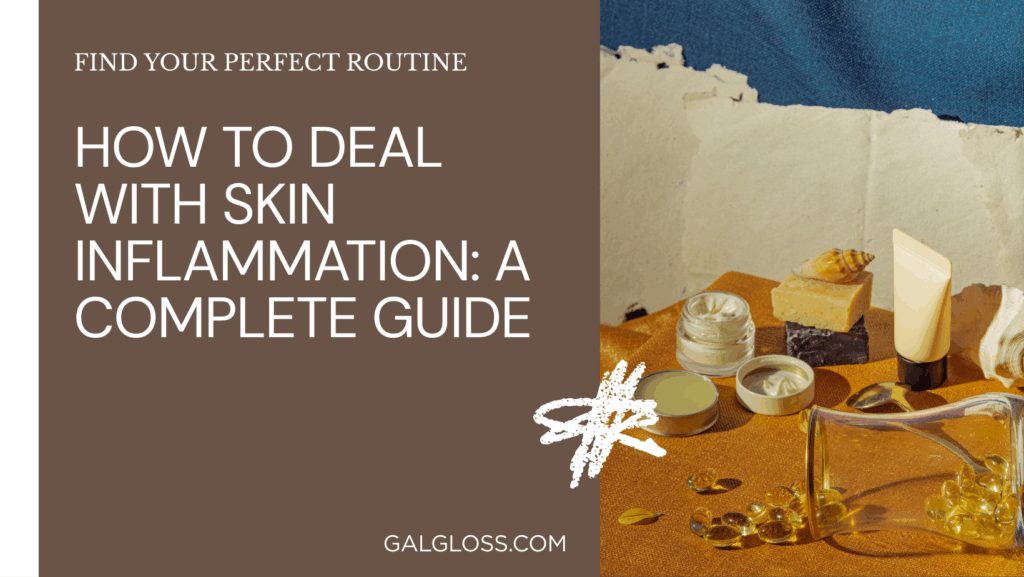Ever felt like your skin’s on fire? Itchy, red, and driving you crazy? You might be dealing with eczema. But don’t worry, you’re not alone in this scratchy situation!
Eczema, also known as atopic dermatitis, is like that uninvited guest who shows up at your skin party. It’s a chronic condition that causes inflammation, redness, and itchiness. And let’s be honest, it’s about as welcome as a porcupine in a balloon store.
But here’s the good news: while there’s no magic wand to make eczema disappear, there are plenty of ways to keep it in check. This guide is your roadmap to smoother, calmer skin. We’ll cover everything from understanding what makes your skin tick (or itch) to practical tips for soothing those angry patches.
Ready to take control of your skin? Let’s scratch the surface of eczema management together!
Understanding Eczema: More Than Just a Rash

Eczema isn’t just one thing – it’s a whole family of skin conditions. Think of it as the Addams Family of skin problems: a bit quirky, often misunderstood, and comes in various forms. The most common types include:
- Atopic dermatitis: The classic eczema, often starting in childhood
- Contact dermatitis: When your skin throws a fit after touching certain substances
- Seborrheic dermatitis: Fancy name for dandruff’s angry cousin
- Nummular eczema: Coin-shaped patches that pop up uninvited
- Dyshidrotic eczema: Tiny, itchy blisters on hands and feet
So, what does eczema look like? It’s like your skin decided to throw a temper tantrum. Common symptoms include:
- Dry, sensitive skin
- Intense itching (especially at night)
- Red, inflamed patches
- Rough, leathery, or scaly areas
- Oozing or crusting
- Swelling
But what causes this skin rebellion? Well, it’s a bit of a mystery, like trying to solve a puzzle with half the pieces missing. Experts believe it’s a combo of genetics and environmental triggers. Some common culprits include:
- Stress (because your skin loves drama)
- Allergens (dust mites, pollen, pet dander)
- Irritants (soaps, detergents, fragrances)
- Climate (cold, dry air or sudden temperature changes)
- Food allergies (dairy, eggs, nuts, soy)
- Hormonal changes
Diagnosing Eczema: When to Call in the Skin Detectives
If you suspect you’re dealing with eczema, it’s time to play Sherlock Holmes with your skin. But instead of a magnifying glass, you’ll need a dermatologist. Here’s when to book that appointment:
- Your skin itches so much you can’t sleep (and counting sheep isn’t helping)
- Over-the-counter treatments aren’t cutting it
- You see signs of skin infection (redness, warmth, pus)
- Eczema is affecting your daily life or mental health
During your visit, expect your doc to:
- Play 20 questions about your symptoms and medical history
- Examine your skin like it’s a crime scene (but much gentler)
- Possibly suggest patch testing or allergy tests
- Discuss treatment options tailored to your unique skin situation
Managing Eczema Symptoms: Your Skin’s Survival Guide
Now, let’s get down to the nitty-gritty of keeping your eczema in check. It’s like being a skin whisperer – you’ve got to listen to what it needs and give it some TLC.
Moisturize, Moisturize, Moisturize!
Your skin is thirstier than a camel in the desert. Keep it hydrated with these tips:
- Apply moisturizer within 3 minutes of bathing to lock in hydration
- Choose fragrance-free, hypoallergenic products
- Look for ingredients like ceramides, hyaluronic acid, and glycerin
- Reapply throughout the day, especially after hand-washing
Identify and Avoid Triggers
Playing detective with your skin can help you avoid flare-ups. Keep a “skin diary” to track potential triggers. Common culprits include:
- Certain fabrics (goodbye, itchy wool sweaters)
- Stress (time to download that meditation app)
- Hot showers (lukewarm is the new hot)
- Sweat (pat, don’t rub after exercise)
- Harsh soaps and detergents
Bathing Basics for Better Skin
Bath time isn’t just for rubber duckies. It’s a crucial part of eczema care:
- Use lukewarm water (hot water is eczema’s frenemy)
- Limit baths to 10-15 minutes
- Use gentle, fragrance-free cleansers
- Pat dry with a soft towel (no vigorous rubbing!)
- Apply moisturizer immediately after
Dress for Skin Success
Your wardrobe can be your skin’s best friend or worst enemy. Choose:
- Soft, breathable fabrics like cotton
- Loose-fitting clothes
- Tagless garments to avoid irritation
- Light layers to prevent overheating
Medical Treatments: When Your Skin Needs a Little Extra Help
Sometimes, your skin needs more than just TLC. That’s where medical treatments come in. Think of them as the special forces in your battle against eczema.
Topical Corticosteroids: The Heavy Hitters
These creams and ointments are like firefighters for your skin, calming inflammation and itching. But use them wisely – they can have side effects if overused.
Immunosuppressants: Calming the Skin Storm
For severe cases, drugs like cyclosporine or methotrexate can help by dialing down your overactive immune system. They’re the big guns, reserved for when other treatments aren’t cutting it.
Antihistamines: The Itch Zappers
These can help you catch some Z’s by reducing nighttime itching. They’re like a lullaby for your skin.
Phototherapy: Bringing Light to the Situation
UV light treatments can help calm inflammation. It’s like sending your skin on a carefully controlled beach vacation.
Natural Remedies: Mother Nature’s Medicine Cabinet
If you’re looking for gentler options, nature has some tricks up its sleeve:
- Colloidal oatmeal baths: Soothing and anti-inflammatory
- Coconut oil: Natural moisturizer with antimicrobial properties
- Aloe vera: Cooling and hydrating
- Chamomile tea compresses: Calming for angry skin
- Meditation and yoga: Because sometimes your skin just needs to chill out
Remember, always chat with your doc before trying new treatments, even natural ones.
Lifestyle Changes: Giving Your Skin a Fresh Start
Sometimes, managing eczema means shaking up your daily routine. Here are some life hacks for happier skin:
Create an Eczema-Friendly Home
- Use a humidifier to keep air moist
- Vacuum regularly to reduce allergens
- Choose fragrance-free cleaning products
- Keep temperatures cool and consistent
Exercise Smart
- Choose low-sweat activities like swimming or yoga
- Shower and moisturize right after workouts
- Wear breathable workout gear
Sleep Your Way to Better Skin
- Use breathable, hypoallergenic bedding
- Keep your bedroom cool and humid
- Trim your nails short to reduce night-time scratching damage
Eczema in Kids: When Little Skin Has Big Problems
Dealing with eczema is tough enough as an adult. For kids, it can be extra challenging. Here’s how to help the little ones:
- Establish a consistent skincare routine (make it fun with stickers or games)
- Choose soft, cotton clothing and bedding
- Keep fingernails short to minimize scratching damage
- Educate teachers and caregivers about your child’s eczema
- Consider wet wrap therapy for severe flare-ups
Remember, eczema can affect a child’s self-esteem and social life. Be supportive and help them build confidence despite their skin challenges.
Living with Eczema: More Than Skin Deep
Eczema isn’t just a skin condition – it can affect your whole life. Here are some tips for thriving, not just surviving:
- Join support groups to connect with others who get it
- Practice stress-management techniques like meditation or deep breathing
- Be open with friends and family about your needs
- Don’t let eczema hold you back from activities you love (just plan ahead!)
Prevention: Staying One Step Ahead of Eczema
While you can’t cure eczema, you can outsmart it. Here’s how to keep flare-ups at bay:
- Stick to your skincare routine, even when your skin looks clear
- Stay hydrated (your skin loves water as much as you do)
- Manage stress through regular exercise, meditation, or hobbies
- Get enough sleep (beauty rest isn’t just a saying)
- Eat a balanced diet rich in anti-inflammatory foods
- Regular check-ups with your dermatologist
Conclusion: Your Skin, Your Journey
Living with eczema can feel like riding a rollercoaster with your skin. There are ups and downs, unexpected turns, and sometimes you just want to get off the ride. But armed with knowledge, a solid skincare routine, and a positive attitude, you can take control of your eczema journey.
Remember, everyone’s skin is unique. What works for one person might not work for another. Be patient with yourself and your skin as you figure out what works best for you. And don’t be afraid to lean on others – whether it’s your dermatologist, support group, or understanding friends and family.
Eczema doesn’t define you. It’s just one part of your story. With the right tools and mindset, you can write a happy ending for your skin saga. So go ahead, show your skin some love, and rock that eczema-fighting confidence!





